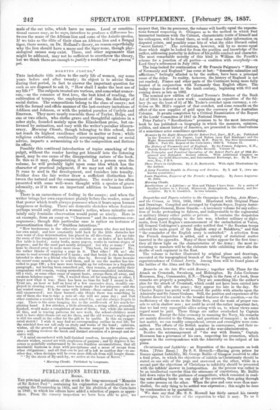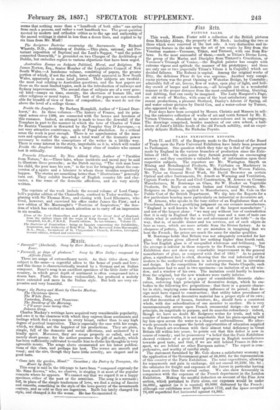PUBLICATIONS RECEIVED.
Boons.
Tics principal publication of the week is the long-announced "Alemoirt of Sir Robert Peel" • containing his explanation or justification for accepting the Premiership in 1834, and for his abolition of the Corn-laws in 1846; to which his editors have added a selection of papers as appendices. From the cursory inspection we have been able to give, we suspect that, like its precursor, the volume will hardly equal the expectations formed respecting it. Glimpses as to the method in which Peel transacted business with the Cabinet, characteristic traits of himself and his colleagues, will he found there, as well as some fuller information on disputed points, and possibly some bits of what the elder Disraeli called "secret history." ,The revelations, however, will by no means equal those which might be looked for from the position and knowledge of the author, addressing posterity in defence of his public conduct and character. The most remarkable novelty of this kind is William the Fourth's scheme for a junction of all parties—a coalition with everybody—on Lord Grey's retirement in July 1834. The long-looked for continuation of Sir Francis Palgrave's "History of Normandy and England" has come at last: "domestic calamities and afflictions," feelingly alluded to by the author, have been a principal cause of the delay. In reality, however, the history of England is not yet reached; France and other parts of the Continent being more fully treated of in conjunction with Normandy than English affairs. The bulky volume is devoted to the tenth century, beginning with 912 and coming down as late as 1002. The nominal new edition of Colonel Torrens's Defence of the Bank Act of 1844 is almost a new work ; containing an exposition of the fallacy (to say the least of it) of Mr. Tooke's crotchet upon currency, a criticism on Mr. Mill's support of that crotchet, and some remarks on the effect of the new supplies of gold upon the currency of the Australian Colonies. It awaits completion by a Critical F.vamination of the Report of the Lords' Committee of 1847 on National Distress.
Peter Parlors "Recollections" promises to be the most interesting book he has published—a biography in which the manners, opinions, politics, and almost history of America, are presented in the observations of a sometimes actor sometimes spectator.
Memoirs by the Right Honourable Sir Robert Peel, Bart., 21.P., 4.e. Published by the Trustees of his Papers, Lord Mahon (now Earl Stanhope) and the Right Honourable Edward Cardwell, M.P. Part II. The New Government ; 1834-0. Part III. Repeal of the Corn-law.; 1540-'6. Volume II.
The History of Normandy and of England. By Sir Francis Palgrave, 1C.H., Deputy Keeper of her Majesty's Public Records. Volume II. The Principles and Practical Operation of Sir Robert Peel's Act of 1844 Explained and Defended. Second edition. With Additional Chapters on Money, the Gold-Discoveries, and International Exchange, Re. By R. Torrens, Esq., F.R.S.
Three Years in California. By J. D. Bortlivkiek. With eight Illustrations by the Author.
A Long Vacation Ramble in Norway and Sweden. By X and Y, (two unknown quantities.) Louis Napoleon, Emperor of the French: a Biography. By James Augustus St. John.
Morning Clouds.
Recollections of a Lifetime; or Men and Things I have Seen. In a series of familiar Letters to a Friend, Historical, Biographical, Anecdotal, and Descriptive. By S. G. Goodrich. In two volumes.
_Despatches and Papers relative to the Campaign in Turkey, Asia Minor, and the Crimea, in 1854, 1855, 1856. Illustrated with Original Plans and Drawings. Compiled and arranged by Captain Sayer, Deputy Assistant Adjutant-General, Horse Guards.—A necessary volume for any collection of books pretending to fulness, and indispensable to the regimental or military library either public or private. It contains the despatches and official papers relating to the late war, whether military or diplomatic, from Lord Raglan's announcement of the embarkation at Varna, till General Codrington's general order notified that " the Russian troops relieved the main guard of the English army at Balaklava," and that "the remainder of the English army is embarked." A selection from the French despatches is added, and a variety of statistical matter inserted in the appendix. Many of these tables appear for the first time ; they all throw light on the characteristics of the Army; the most interesting to numbers will be the elaborate table exhibiting inter alia the deaths of each regiment in the East.
The volume is further illustrated by original plans and drawings, executed at the topographical branch of the War Deportment, under the superintendence of Colonel Jervis. Among them will be found plans of the battles of the Alma and the Tchemaya.
Remarks on the late War with Russia; together with Plans for the Attack on Cronstadt, Sweaborg, and Helsingfora By John Cochrane Hosoason, Esq., Commander, R.N.—Though in the form of a book, these remarks are properly a pamphlet. They are something like the author's plan for the attack of Cronstadt, which could not have been carried into execution till after the peace ; they appear too late in the day. Sir Charles Napier has pretty well wearied the public with attacks upon the Admiralty and Sir James Graham. Still, the position and experience of Sir Charles directed his mind to the broader features of the question,—as the inefficiency of the crews in the Baltic fleet, and the want of proper vessels to act in shallow seas ; nor could he avoid the.rather important fact, that we had very susceptible allies acting with us, to whose views some regard must be paid. These things are rather overlooked by Captain Hoseason. Except the false economy in manning the Navy, his remarks are mainly directed to the Crimea, and questions of transport ; in which last matter, we can readily comprehend, errors and oversights were committed. The efforts of the British marine in conveyance, and their results, are not, however, the weak points of the war-administration.
Besides the mismanagement of "the war with Russia," Captain Hoseason has a grievance of his own, respecting his promotion, which appears in the correspondence with the Admiralty on the subject of his plans.
Christianity and Infidelity : an Exposition of the Arguments on both Sides. [Prize Essay.] By S. S. Hennell.—Having given prizes for Essays against Infidelity, Mr. George Baillie of Glasgow resolved to offer a final prize, in which the objections of infidels to Christianity should be stated on one side of the page and answered on the other, while in a second part the objections of Christians to infidelity should be presented with the infidel? answer in juxtaposition. Is the process was rather to be an intellectual exercise than the utterance of convictions, Mr. ' illie laid down rules for the guidance of competitors, which consisted in reading and marking books on one side of the question, then going through the same process on the other. When the pros and cons were thus marshalled, the only thing to be settled was expression ; this might be done by condensation or by quotation. Wedare say that Mr. S. S. Hennell has fairly earned his twenty sovereigns, let the value of the exposition be what it may. To us it
seems that nothing more than a "handbook of both sides" can spring froin such a proceas, and rather a curt handbook too. The great question mooted by modern and orthodox critics as to the age and authorship of the sacred writings is stated in less than a dozen lines, and replied to by six lines from Mr. Miall!
The Scripture Doctrine concerning the Sacraments. By Richard Whately, D.D., Archbishop of Dubin—This plain, rational, and Protestant exposition of Baptism; and the Lord's Supper, "and the points connected therewith," is grounded on two Charges of the Archbishop of Dublin, but embodies replies to various objections that have been urged.
Australian Essays on Subjects Political, Moral, and Religious. By James Norton, Esq., Senior Member of the Legislative Council of New South Wales.—A handsome volume, consisting of papers, the greater portion of which, if not the whole, have already appeared in New South Wales, apparently in some local ,journal. Their subjects are twofold ; the most real relating to Australian questions, and the best papers are those on the most limited topics, such as the introduction of railways and Sydney improvements. The second class of subjects are of a very general kind—essays on time, eternity, the shortness of human life, and other religious or moral topics. The best of the papers are not remarkable for breadth of view or force of composition; the worst do not rise above the level of a college theme.
Freida the Jongleur. By Barbara Hemphill, Author of "Lionel Deerhurst," &c. In three volumes.--The history of France, and its principal actors circa 1300, are connected with the heroes and heroines of this romance. Indeed, an attempt is made to trace the downfall of the Templars in_part to the manner in which the love of Charles of Valois for Beatrix Viscontk is thwarted by the Templar Guy D'Auvergne,—a not very attractive contrivance, spite of Papal absolution. In a critical sense the work is poor enough. There is no apprehension of the manners and opinions of the age, and a total want of the dramatic power necessary to realize the conceptions of the writer in a lifelike way. There is some interest in the story, improbable as it is, which will render Freida the iongleur interesting to a large class of readers who cannot test it critically.
Proverbs Illustrated. By Mrs. Alfred Gritty, Author of "Parables from Nature," &c.—Three tales, whose incidents and moral may be said to illustrate three proverbs ; as the Dutch saying, "The rich man loses his child, the poor Man his cow," is the text for bringing about the conversion of a squire and a labourer to whom these troubles respectively happen. The stories are something better than "illustrations" generally turn out. They exhibit knowledge of English country life and character, a fine sense of the domestic affections, and are very nicely written.
The reprints of the week include the second volume of Lord Campbell's popular edition of the Chancellors, confined to Tudor worthies, beginning with Sir Thomas More, and closing with Lord Ellesmere, who lived, however, and exercised his office under James the First ; and a new edition of Mr. Macnaught's "Doctrine of Inspiration," the freedom of which has excited so much attention as to carry off an impression in six months.
Lives of the Lord Chancellors and Keepers of the Great Seal of England,
from the earliest times till the reign of King George IV. By John Lord Campbell, LL.D., F.R.S.E. Fourth edition. In ten volumes. Volume II. The Doctrine of Inspiration : being an Inquiry concerning the Infallibility, Inspiration, and Authority of Holy Writ. By the Reverend John Macnaught, M.A., Oxon., Incumbent of St. Chrysostom's Church, K■erton, Liverpool. Second edition, revised and corrected.



































 Previous page
Previous page